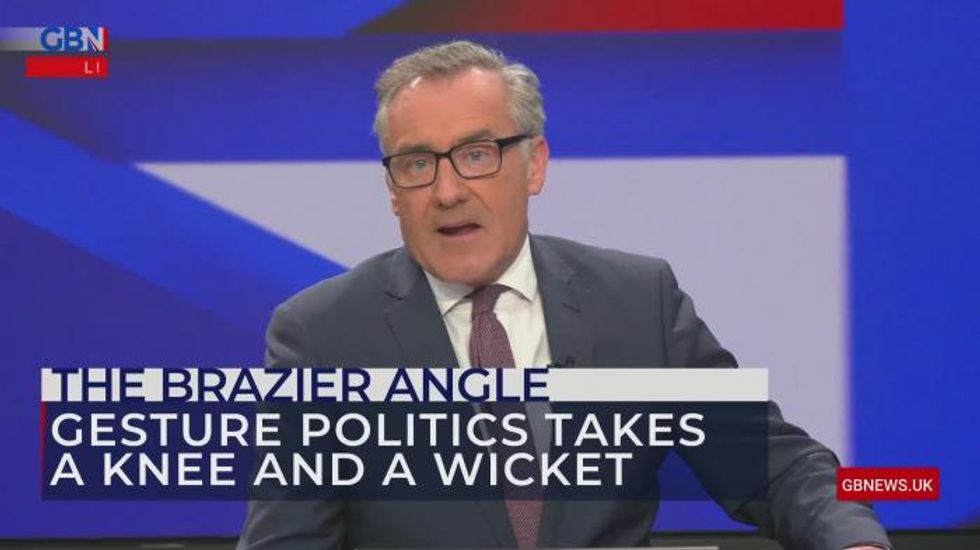Don't Miss
Most Read
Trending on GB News
The Cambridge University dictionary defines gesture politics thus: “Any action by a person or organisation done for political reasons and intended to attract public attention but having little real effect.”
In a moment we’ll come back to that quote. But first the reason I mention it at all.
If you’re a cricket fan, you’ll have heard of Quentin de Kock, one of the world’s most gifted wicketkeeper batsmen. His career has been hanging in the balance for the last 48 hours. Not because of an injury, but a decision he took on Tuesday.
He was sitting on a coach, heading for a stadium in Dubai and a T20 world cup match against the West Indies. In previous fixtures he had stood to attention as a mark of commitment to anti-racism, but on Tuesday the men who administer South African cricket decided that wasn’t enough. The players HAD to take the knee.
No debate, no discussion, no forewarning, no dissension.
If a player now wanted to represent his nation, he could skip singing the national anthem, but he had to take the knee. At the time Quinton de Kock didn’t elaborate on his one-man boycott. But today an astonishing statement, a crie de Coeur for free speech, a heartfelt rejection of the increasingly dominant view that there is only one way to express disapproval of racism – and that is by taking the knee.
The wicketkeeper reminded everyone that he comes from a mixed race family. That he has a black stepmother. And that he is emphatically not a racist.
He wrote: “I didn’t understand why I had to prove it with a gesture, when I live and learn and love people from all walks of life every day. When you are told what to do, with no discussion, I felt like it takes away the meaning. If I was a racist, I could easily have taken the knee and lied, which is wrong and doesn’t build a better society.”
In this de Kock echoes the words of other sportsmen who refuse to be swept up by a prevailing orthodoxy. Last year QPR’s director of football, Les Ferdinand, said taking the knee was an increasingly empty gesture. So de Kock is not the first person in sport to point out that taking the knee does not somehow magically purge an individual of racism.
But he might be the first professional athlete to be placed in a moral cleft stick, with no choice but to go along with something he conscientiously objects to – for reasons by the way that he keeps to himself – for fear of losing his livelihood.
To put this into context, de Kock is 28. His partner is pregnant, and he can confidently expect to earn millions over the next five or so years. But from that moment on Tuesday, when he didn’t take to the pitch, that financial security was thrown into doubt. Questions were immediately raised about whether he’d ever play for South Africa again.
More ruinously, de Kock is one of many cricketers made a millionaire by playing in India and by yesterday it began to look like he might be expelled from that goldmine.
Who could blame De Kock, a man who has bent his life around cricket, for staring into the abyss of obscurity and deciding to take a pace backwards. In his statement today he said he was sorry for all the fuss he’d caused and would now take the knee if it would help. Will that save his career? Maybe. But for many people what’s happened to de Kock will sound like compulsion.
For a gesture of solidarity to have any power and legitimacy it must be voluntary. There has to be a choice. Otherwise it becomes an order and, to go back where we started, it becomes an expression of gesture politics at best, authoritarianism at worst. Cricket South Africa insists that by demanding players take the knee they are enforcing unity, an odd word to use for an institution which champions diversity.
We still don’t know why de Kock has never taken the knee. In his statement today there were clues. He said that “black lives have mattered since I was born”, but he pointedly avoided any mention of BLM, the movement.
For a minority of people BLM is a Marxist organisation and taking the knee is tainted by association. We have no idea if that’s why de Kock didn’t take the knee. But what business is it of ours. He’s paid to play cricket. We pay to watch him do that. We have not bought tickets to peer into the man’s soul. That's the Brazier Angle.











